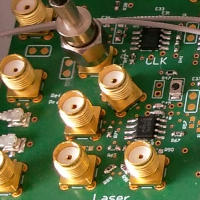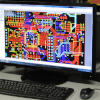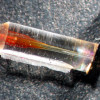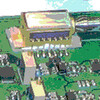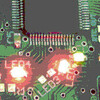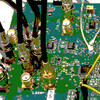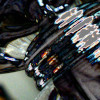This page presents a comprehensive list of product ranges, services
and core competencies of Efopti Systems, allowing to support
customers in a variety of markets.
For more information
and for inquiries use the contact address given at the end of this
page.
Specialized on the development and manufacturing
of
custom-specific products and on
supporting OEMs with
sensor- and photonics- related subsystems
Product Range
Based on the motto "We provide solutions when off-the-shelf
products or catalogue components don't fit" here it is not easy to
show simply a list of products, especially since most developments are
legally committed to non-disclosure agreements. Instead it is more
helpful to mention the key technologies and expertise, by which Efopti
Systems is able to best support its customers:
➤ Analogue & Digital Electronics
➤ Sensor
Technologies
➤ Optical Technologies
➤ Photonics
➤ Embedded Systems
➤ Signal Recovery
Techniques
➤ Data Acquisition & Analysis
Software
➤ Back-End Server Software
The size of our products are usually table-top or smaller.
Quite often they are small sub-systems to fit into much bigger units,
the end-products of our customers. These end products might be even
large industrial production units, where our sub-systems act as
supporting e.g. the test & measurement tasks.
Development and Production Steps
✽ Some production steps and certain optical and electronical
developments
are provided in cooperation with our partners in
Europe, especially in Germany. ✽
Our Main Markets
The most effective way of presenting the product range of Efopti
Systems is to categorize the markets our customers are participating:
➤ Test & Measurement
➤ Industrial
Automation and Scan & Motion
➤ Medical Devices
& Health Care
➤ Communications
➤
Aerospace
➤ Security & Surveillance
➤ Agriculture
➤ Oil & Gas
➤ Mining & Minerals Processing
The typical path of getting in contact with clients of these
markets is by requests of them to us, regarding solutions to upgrade
or improve their existing products. Or by requests regarding their new
product designs, integrating cost-efficient sub-systems, which are not
available off-the-shelf.
Cost-efficiency is achieved by
tailoring our systems exactly to the customers needs. By this way the
additional development costs are compensated by lower production costs
of the product.
Our Technologies and Expertise in Detail
Analogue & Digital Electronics
Even though a lot of integrated circuits are existing in this field,
the need for applying discrete and hybrid solutions is very common.
So it is almost a daily routine to run developments on specific
- Amplifiers & Discrete Filters
- Detector Drivers & Laser Drivers
- Low Signal and Noisy Signal Recovery Techniques
- Homodyne and Heterodyne Detection
- GHz Digital Electronics for Sensor and Ranging
Applications
The topic Sensor Technologies mainly includes understanding of the
internal working principles and the correct application of MEMS-based
integrated components.
Such sensors are e.g.
- Accelerometers
- Gyrometers
- Barometers
- Microphones
The most critical part of using these sensor is of course
the data acquisition and analysis part by specific software. The
software is typically running on μControllers in embedded systems.
So restrictions in memory and computation power are apparent,
especially in small units with rechargeable batteries.
The Optical Technologies are the foundation of the Photonics
Technologies, mentioned in the next topic. Without solid knowledge in
this field, a lot of mistakes and unstable installations are
inevitable when designing Laser-based systems.
Nonetheless
these technologies are not simply of the bread-and-butter type. For
example the interferometry can be applied for very sophisticated
measurement systems with spatial resolution down to nanometers, much
lower than the wavelength of the light it is using.
- Optics & Imaging Systems
- Fiber Optics for Illumination and Data Transfer
- Interferometry and other Coherence Effects
- Optical Coatings
A lot of non-invasive medical examination methods are based not on
X-rays or ultrasound, but on Photonics. Their main advantage is the
low cost and ease-of-use. It is one of many successful examples of
using light for non-contact measurements and remote sensing.
- Lasers and LEDs and OLEDs (UV, VIS, NIR, IR)
- Optical Coatings for Laser Applications
- Photodiodes, Photomultipliers & other
High-Sensitivity-Detectors
- 2D-Displays and Sensor-Arrays (VIS & NIR)
- Fiber Amplifiers, e.g. EDFAs and YDFAs
- Fiber-Optical Components, like Filters, Couplers and
Attenuators
- Non-contact Measurement
- Remote Sensing
- LIDAR (Laser Imaging, Detection and Ranging)
- OCT (Optical Coherence Tomography)
The topic itself is highly specific and needs lots of experience for
successful design and application. The Laser and detector components
are highly sensitive to electrostatic discharges and fast current
transients, which demands for special electronics. The low-noise
amplification of very small currents is required for reading-out of
sensors and detectors.
Optical fibers and connectors require
special mechanical handling, which is not general knowledge.
Almost every of our products contain some sort of devices from the
following list. They are required for acquisition of data of any
kind, for initial filtering, aggregation, storage and analysis inside
the product.
As well they are required for transmission of
the data and information to the embedding unit. In addition any
information of the embedding unit for controlling and signaling to our
product is received and processed inside the Embedded System on the
list:
- Single Board Computers (SBC) with Linux OS
- μController Boards (32bit MCUs up to 300MHz)
- Firmware for μControllers
- Li-Ion Battery Management Devices and Software
Even though the manufacturers of the μControllers are supporting
the embedded software developers with many tools and template code, to
achieve fast and memory-efficient code, we are developing own
optimized software.
This especially holds for the operating
system (OS) part of the μController code, which is 100% own
IP.
Given the complexity of the μControllers
with a huge number of internal interface units with many configuration
options, it is inevitable that interfaces will generate anomalies under
certain operating conditions. This holds e.g. for the SPI, I2C, UART
interfaces, or the DMA channels. Nonetheless, with many years of
experience in working with many different kinds of μController
families, we developed code to avoid the known anomalies.
Experience in designing and manufacturing Wireless Units is required
regarding
⇒ Materials selection (affecting radiation
propagation)
⇒ Selection of data transmission protocols
(affecting transmission bandwidth, security and encryption)
⇒ Balancing transmission range versus power consumption, e.g. by
applying data payload coding and compression based on own IP
We are specialized in:
- Wireless Data Transmission in the 2GHz and 5GHz band (e.g.
Bluetooth BLE Secure 5, Wi-Fi)
- Antenna designs, PCB based and Coax based
- Mobile Units with μControllers and Li Ion Batteries
- Desktop Units and Smartphone-based
Signal Recovery Techniques
These techniques are applied as a combination of special
electronics and software for analyzing the signals:
- Fast Fourier Transform (FFT)
- Lock-In
- Digital Synchronous Demodulation
- Golay Sequence Auto-correlation Techniques
Data Acquisition & Analysis
Software
This kind of software is mainly running on our μControllers inside
of embedded systems. It has to be optimized for very fast results
without consuming too much RAM memory.
An initial real-time analysis of raw data of sensor output
is necessary for example in medical devices. To achieve high
temporal resolution, high sampling rates of the detectors are applied.
These sampled data is impossible to be transferred wireless to the
host without a huge power consumption. Instead it gets analyzed, and
the final result (e.g. a heart rate) being transmitted wireless at a
much lower rate.
To support clients in processing the data received from our
products, we provide assistance with operating Linux-based server
software. And we provide own software developments, especially for
subsequent advanced analysis of real-time data of our systems.
- TURN Servers and Gateways
- Relational Databases and Time Series DBs
- Advanced Data Analysis Software (e.g. Indexing, pattern
discovery, data mining)
Requests can be sent to ef efmonisys.com



